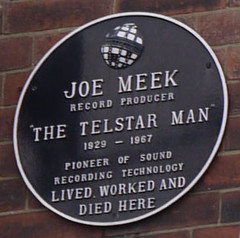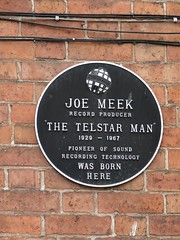Joe Meek
(1929-1967)
Died aged c. 38
Wikidata WikipediaRobert George "Joe" Meek (5 April 1929 – 3 February 1967) was an English record producer, sound engineer and songwriter who pioneered space age and experimental pop music. He also assisted in the development of recording practices like overdubbing, sampling and reverberation. Meek is considered one of the most influential sound engineers of all time, being one of the first to develop ideas such as the recording studio as an instrument, and becoming one of the first producers to be recognised for his individual identity as an artist. Charting singles Meek produced for other artists include "Johnny Remember Me" (John Leyton, 1961), "Just Like Eddie" (Heinz, 1963), "Angela Jones" (Michael Cox, 1960), "Have I the Right?" (the Honeycombs, 1964), and "Tribute to Buddy Holly" (Mike Berry, 1961). The Tornados' instrumental "Telstar" (1962), written and produced by Meek, became the first record by a British rock group to reach number one in the US Hot 100. It also spent five weeks at number one in the UK singles chart, with Meek receiving an Ivor Novello Award for this production as the "Best-Selling A-Side" of 1962. He also produced music for films such as Live It Up! (US title Sing and Swing, 1963), a pop music film. Meek's concept album I Hear a New World (1960), which contains innovative use of electronic sounds, was not fully released in his lifetime. His reputation for experiments in recording music was acknowledged by the Music Producers Guild who in 2009 created "The Joe Meek Award for Innovation in Production" as a "homage to [the] remarkable producer's pioneering spirit". In 2014, Meek was ranked the greatest producer of all time by NME, elaborating: "Meek was a complete trailblazer, attempting endless new ideas in his search for the perfect sound. ... The legacy of his endless experimentation is writ large over most of your favourite music today." At the time of his death, Meek possessed thousands of unreleased recordings later dubbed "The Tea Chest Tapes". His commercial success as a producer was short-lived, and he gradually sank into debt and depression. On 3 February 1967, using a shotgun owned by musician Heinz Burt, Meek killed his landlady, Violet Shenton, and then shot himself.
DbPedia
Commemorated on 3 plaques
Joe Meek record producer "The Telstar Man" 1929-1967 pioneer of sound recording technology lived worked and died here
304b Holloway Road, London, United Kingdom where they lived , worked , and died (1967)
Joe Meek record producer "The Telstar Man" 1929-1967 pioneer of sound recording technology was born here
1 Market Square, Newent, United Kingdom where they was born (1929)
In Memory of Pioneering Record Producer Joe Meek "The Telstar Man"
Bench outside 304 Holloway Road, N7., London, United Kingdom where they lived near


